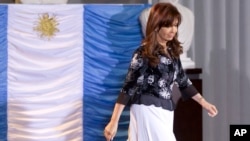Argentina, which faces an acute hard currency shortage, sought to toughen international trade controls on Monday by creating a new agency to keep track of imports and exports and said it would keep tightening currency restrictions.
Financial authorities in the South American country are waging a crackdown on black-market dollar trading and capital flight mechanisms after a sharp slump in the peso and a drain on foreign currency reserves this year.
“It was agreed to sustain and deepen policies and procedures for controlling and monitoring the [financial] system,” the central bank said in a statement after a meeting of financial bodies including the tax office.
President Cristina Fernandez began restricting access to dollars through legal channels in 2011, forcing many Argentines to use the black market and legal loopholes to purchase greenbacks.
A devaluation in January and a debt default in July battered confidence in the peso and triggered an outflow of capital. The peso sank to a record low of 15.95 in late September, prompting the latest crackdown under the watch of a new central bank chief, Alejandro Vanoli.
The bank has tried to dampen demand for U.S. currency by further limiting the amount available to importers. It also clamped down on the so-called “blue-chip swap,” whereby Argentine investors buy local stocks cross-listed in New York and convert them into American Depositary Receipts, selling them in the United States for dollars.
Tax authorities have raided currency exchange houses and stock brokers, slowing capital flight in the short term.
The black-market peso ended Monday at 13.43 per dollar, 0.7 percent weaker for the session, after another day of volatile trading. The official peso rate was little moved at 8.5100 .
Critics of Fernandez question how sustainable her controls are amid wider concerns about Latin America's No. 3 economy.
On Monday the government published a decree creating the Trade Operations Tracking Unit which will “verify the price and quantity of goods and services exported and imported, along with the inflow and outflow of foreign exchange.”
Its establishment comes two weeks after Argentina accused U.S. household products giant Procter & Gamble Co. of tax fraud, as part of an alleged bid to get more hard currency out of the country.
Cincinnati-based P&G has denied wrongdoing.





